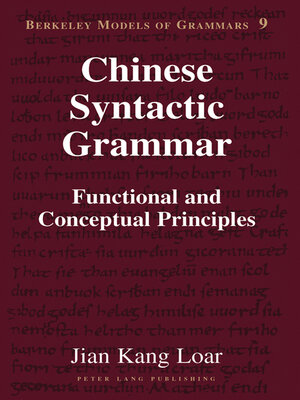Chinese Syntactic Grammar
ebook ∣ Functional and Conceptual Principles · Berkeley Models of Grammars
By Irmengard Rauch

Sign up to save your library
With an OverDrive account, you can save your favorite libraries for at-a-glance information about availability. Find out more about OverDrive accounts.
Find this title in Libby, the library reading app by OverDrive.



Search for a digital library with this title
Title found at these libraries:
| Loading... |
Chinese Syntactic Grammar: Functional and Conceptual Principles is unique in that it discusses the organizational principles of Chinese syntactic structures in terms of conceptual and functional principles, which are iconic and hence are easy to understand and apply. The organizational principles mainly comprise the three Chinese conceptual principles of Temporal Sequence, Temporal Scope, and Whole-Before-Part (Tai, 1985) and the two functional principles of Communicative Dynamism and the Principle of Topic-End Focus. By analyzing the semantic roles of each clause element, Chinese Syntactic Grammar reveals that the conceptual principles play a crucial role in organizing ideas and bringing units (such as subject, verb, and object) together to form grammatical sequences, which manifest S (A) V O (C), which is the basic Chinese word order. The functional principles control and govern variations of the basic sentence structure, which are motivated to facilitate effective communication and achieve specific communicative goals, thus generating several special structures, including the Bá/Bèi/null Bèi sentences, etc. The variant forms are motivated to achieve special communicative goals, and to facilitate effective communication.
Another feature of the book is that it focuses on reasons, rather than merely on a description of rules. The language is lucid, and the arguments are cogent. The scope and depth of the investigation make the volume one of the most thorough and relatively complete pedagogical reference books. Chinese Syntactic Grammar can serve as a textbook for training professional CFL teachers. It is a must-read book for Mandarin Chinese teachers as a handy manual, also for intermediate and advanced Chinese learners if they want to have deeper insight into the nature of the Chinese language. Linguists who are interested in cognitive grammar and specialists across many fields including education, psychology, communication, and information science will find the book enlightening and interesting.
Another feature of the book is that it focuses on reasons, rather than merely on a description of rules. The language is lucid, and the arguments are cogent. The scope and depth of the investigation make the volume one of the most thorough and relatively complete pedagogical reference books. Chinese Syntactic Grammar can serve as a textbook for training professional CFL teachers. It is a must-read book for Mandarin Chinese teachers as a handy manual, also for intermediate and advanced Chinese learners if they want to have deeper insight into the nature of the Chinese language. Linguists who are interested in cognitive grammar and specialists across many fields including education, psychology, communication, and information science will find the book enlightening and interesting.







